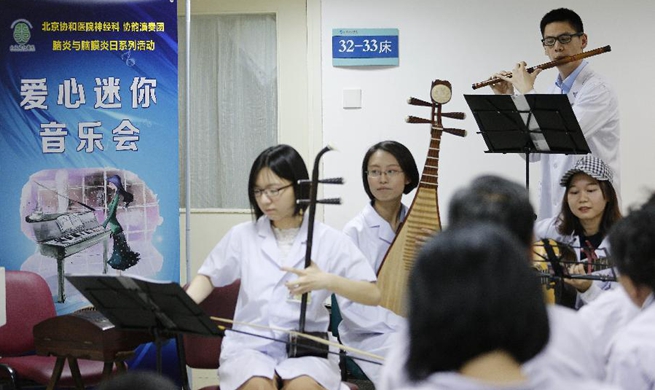HAVANA, May 3 (Xinhua) -- Along one of Havana's busiest avenues, a renovated warehouse now houses a place that has long been a dream for the Cuban non-state sector.
The first wholesale market on the island, known as Mercabal, is currently providing large-scale food deliveries to non-agricultural cooperatives (CNA) in the city but soon plans to expand services for private workers in the country.
In 2016, the Ministry of Domestic Trade (MINCIN) created a working group to evaluate the feasibility of such markets. After more than two years of studies Mercabal was inaugurated last March.
"The goal of the wholesale market is to concentrate all the products in a single place which helps the CNA's to acquire them with payment facilities, substantial discounts and delivery of the goods," Uber Crespo, a top MINCIN official, told Xinhua.
According to Crespo, the ministry decided to open this first market in the Cuban capital, because it's where the largest amount of cooperatives related to gastronomic services exist in the island for a total of 59.
"In the market all products the cooperatives had previously requested in their yearly plan are sold. This is the first experience in Cuba and the idea is to implement these types of markets throughout the country," he said.
Mercabal offers 57 products for the moment, including rice, sugar, oil, salt, flour, varieties of grains, chicken, sausage, hot dogs, soft drinks, liquors, rums, beer, cigar and tobacco.
"For the CNAs, it's very attractive because they are offered here the goods at the same prices that at retail stores but with 20 percent discount and 30 percent in the case of chicken, hot dogs and sausages," Vanessa Perez, director of MINCIN's wholesale company in Havana, said to Xinhua.
The products seeing the highest demand so far have been chicken, flour, rice, beverages and sweets.
26 of the 59 CNAs dedicated to gastronomy in Havana have already bought produce at Mercabal. From its commercial opening on March 10 until March 31, sales reached 1.2 million pesos (about 45,200 U.S. dollars).
This figure is still far from the goal of selling some 7 million pesos (about 264,000 USD) monthly to the cooperatives, Teresa de la Caridad Rodriguez, the market's administrator, told Xinhua.
"We've had good opinions from the cooperative members because they have all the necessary merchandise in one place, we deliver it to them in less than 72 hours and it arrives in good condition and with the proper weight in the case of frozen products," said Rodriguez.
Another important feature of the wholesale market is the use of new ways of making financial transactions, which are still developing in Cuba.
"Everything is done through electronic payment channels, there is no cash involved. The CNA's go to the bank, open their account as cooperative members, deposit the cash and then come to the market to make their purchase," said Rodriguez.
For cooperative members, this a new way of accessing necessary supplies for their restaurants or cafeterias, which has been a regular demand from the island's private sector for several years.
Such is the case of Idania Pulido, the main partner of a non-agricultural cooperative on the outskirts of Havana that sells different foods and drinks in a cafeteria.
"The wholesale market initiative has been very good and beneficial for us mainly because we buy the products at discounted rates and can sell at fair prices to the people," she said.
However, Havana has not established an inspection mechanism or price caps for cooperatives that access food products with discounts through these types of markets, a measure that Cubans hope will soon be implemented.
Pulido said Mercabal has a good variety of supplies members and has mostly bought soft drinks and desserts for her cafeteria.
Expanding such initiatives for the non-state sector is a priority for the Cuban government as it continues opening up to the private sector.
"The experience in this market will tell us what we should correct and do differently for the next ones that will open in different locations. This is the first phase, we want it to meet the needs of CNA's and for them to feel safe and comfortable buying at better prices," said Crespo.
According to the National Office of Statistics and Information (ONEI), Cuba closed 2017 with 431 CNAs, a new form of business promoted since 2013 as part of the island's economic reforms.
Of them, 147 are engaged in activities related to hospitality and food services, while 135 work in the trade and repair of personal effects, 60 in construction and 49 in manufacturing, among other activities.
The expansion of private work has been one of the most popular reform measures in the island. Around 585,000 Cubans work in the non-state sector while a law to legalize small and medium-size private companies is still pending.

















